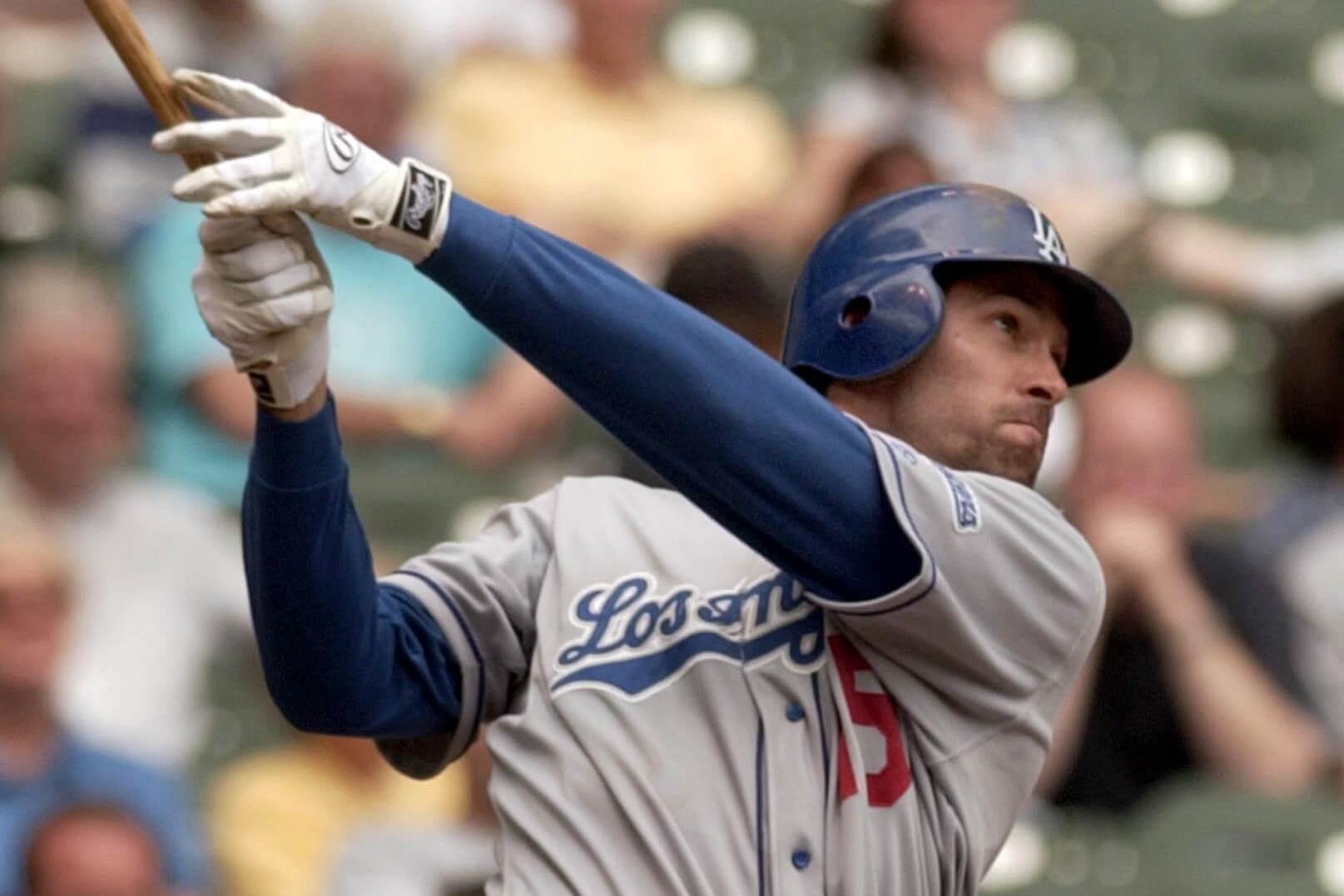
Dodgers manager Jim Tracy planned to pinch-hit for Shawn Green in the ninth inning on May 23, 2002, but the right fielder argued his way into one final at-bat. If a couple guys reached base, Green reasoned, he could have one more chance at history.
Tracy relented, Green earned one more trip to the plate, and power met opportunity.
Advertisement
That afternoon in Milwaukee, Green became the 14th player in major-league history to hit four home runs in one game. That number has since swelled to 19, the latest being Eugenio Suárez, who belted four over the fence for the Diamondbacks last Saturday.
Whenever the four-homer club adds a member, Green receives a few tweets or a text. He’ll find his name included in some MLB social media post.
“It definitely pulls me back into relevance for that one day,” he said.
It’s a rare feat, one accomplished by the sport’s titans, including Willie Mays, Lou Gehrig and Mike Schmidt. The exclusive club also includes some relatively surprising members, such as Mark Whiten and Scooter Gennett.
“I had never hit 20 (in a season) at that point,” said Gennett, who homered four times for the Reds on June 6, 2017. “You know when you’re witnessing something that shouldn’t happen.”
For a spectacle that happens, on average, about once every seven years since Bobby Lowe of the Boston Beaneaters first did it on May 30, 1894, a four-homer game doesn’t seem to attract the notoriety of, say, a perfect game. There have been 24 of those, yet they are treated with a reverence and lasting glory that the four-homer game doesn’t enjoy.
“I just think it’s more of a fluke event,” Green said.
Suárez hit his four homers on a Saturday night, in the Pacific time zone, during a weekend featuring the NFL Draft and the NBA playoffs. Oh, and despite all of his muscle, his team lost the game. The conditions were right for his output to barely make a ripple on the national sports landscape.
As a pitcher works toward a perfect game, the momentum and attention build toward the crescendo of the 27th out — or the first baserunner. There have been 673 occasions in which a player has hit at least three homers in a game, but only 2.8 percent of those hitters were able to tack on a fourth. In some cases, they probably just needed one more chance to aim for the fences.
Advertisement
A four-homer performance typically requires a team-wide offensive explosion to grant the primary power supplier an extra at-bat or two. Arizona’s seven runs Saturday were the fewest by any team that had a player erupt for four homers. The 19 teams have averaged 13.3 runs, and they’ve gone 16-3. Suárez’s feat was the first in a losing effort in 39 years.
“Everything has to happen exactly right,” Green said.

Green’s fourth home run of the day on May 23, 2002 wrote him into the history books. (Tannen Maury / AFP via Getty Images)
On March 29, the day the Yankees stirred the baseball world into a torpedo bat frenzy, Aaron Judge hit three homers in the first four innings. With the Yankees clobbering the Brewers, 20-7, he approached the plate in the eighth to square off against a pitcher he had never faced: first baseman Jake Bauers.
Judge lined out to left field, the only out he made all afternoon. He finished with three homers, eight RBI and 14 total bases, but he fell short of four-homer history.
“I thought he was gonna do it,” said Mike Ford, an outfielder playing for the Twins’ Triple-A affiliate. “I was like, ‘Go figure, he doesn’t hit one off the position player.”
Ford should know. He was once a Yankee farmhand, and hit four homers in a game on May 25, 2014, for the New York’s Class-A affiliate, the Charleston RiverDogs. He and Judge went back-to-back that day.
“Everyone’s in the dugout, like, ‘No way you can do three,’” Ford said. “And then you hit the third one and they’re like, ‘No chance you can do four.’ It becomes a game with the guys. Once you get past two, you’re just hunting a pitch you can do a lot of damage on. It simplifies it for you. One pitch, one spot and go.”
For a no-hitter or perfect game, there’s a tacit understanding that no one should speak to the pitcher. There are no extracurriculars, only anticipation in a dugout so quiet it resembles a library.
“A perfect game, you’re more in control and it feels like more of a feat that you’re striving toward,” Green said. “Whereas, as a hitter, you’re not striving to hit four home runs in a game.”
Advertisement
No, but once you hit three, it’s hard not to think about a fourth — provided you get the chance.
Gennett was making his third career start in left field the night of his entry into the record books. He could hear fans in the outfield yelling at him: You won’t hit four. He acknowledged the pressures of the game situation typically overshadow personal goals, but in that scenario, with the Reds ahead by 10 when he approached the batter’s box in the ninth inning, he couldn’t think about anything but swinging out of his cleats.
“You know the moment you’re in,” Gennett said. “It’s just, can you relax? Can you control your heart rate and breathing?”
Green had been booed at Dodger Stadium the week before, as he limped toward Memorial Day with a .230 average and three home runs on the season. He wanted that final at-bat, not only to vie for history but also to keep building his confidence. It’s not so much the four home runs he’s proud of, he said, but that he hit nine in a span of five days, and kept humming at the plate after that game.
When Green batted for the final time in his game, the Dodgers led by 12. He wasn’t sure if he’d get drilled or if the Brewers would pitch around him. Milwaukee pitcher José Cabrera went after him as if the score were tied, which Green obviously appreciated. Gennett considered it “cool and honorable” that Cardinals pitcher John Brebbia didn’t nibble around the strike zone during their ninth-inning duel.
“I think Barry Bonds would have done it 20 times if pitchers would have thrown to him,” Gennett said.
Barry Larkin played shortstop behind Tom Browning during the southpaw’s perfect game against the Dodgers at Riverfront Stadium on Sept. 16, 1988. At the same venue on Sept. 7, 1993, he was injured but seated on the bench in the opposing dugout for Whiten’s four-homer game for the Cardinals in the second game of a doubleheader.
Advertisement
“The perfect game is probably the more impressive one,” Larkin said, “just because there’s so much you can’t control. A pitcher can be bad and you can take four good swings and hit the ball at elevation and nobody can do anything about it.”
And yet …
“The pitcher still has to pitch the ball to you and (give you) something to hit,” Larkin conceded. “You can’t hit four home runs if they walk you four times.”
Ultimately, Larkin settled on the perfect game as the more difficult feat to attain.
There’s just so much more that has to go right,” he said.
Plus, the perfect game assures the other team doesn’t score. Suárez’s four home runs kept the Diamondbacks alive on Saturday, but they still came up short in 10 innings.
Gennett tuned in to watch his former Reds teammate that night, but fell asleep before Suárez socked his fourth. The odds were too stacked against Suárez for Gennett to commit to a later bedtime.
“There was one pitch up and away that he pulled at (97 mph). I was like, ‘Geez, he’s so locked in,’” Gennett said. “That reminded me of my swing — the third one, I hit down the line. It was up and away and I threw my hands and hit it perfect. It was like, ‘OK, I’m onto something here. Something special’s happening.’ It’s really hard to do, but you also have to get pitches.”
Ford, who played both ways at Princeton, said he had a four-homer game and a no-hitter in high school — in the same game. His coach instructed him to take a 3-2 pitch in his final at-bat, but “I didn’t listen,” he said. “I wanted that four spot.”
Which achievement was he more proud of? He still can’t say.
“Either one is a once-in-a-very-large-period-of-time game,” he said.
Said Green: “When you think about a perfect game, it feels more immersive. That dude’s out there for a two-and-a-half-hour game and is going through, hitter by hitter, and dominating. It feels different. It feels more like a marathon as opposed to, you pop a couple balls over the fence and you’re locked in and those last two fall into place and you get the opportunities, you get the pitches, you don’t get walked and you’re in the zone. It’s a different deal.”
Advertisement
Gennett hit 87 home runs over his seven years in the majors, meaning, nearly 5 percent of his career home run total took place in a span of two hours and 47 minutes. He compared that night to winning the lottery.
“Hitting one home run is getting lucky, in my opinion,” he said. “Aaron Judge gets lucky 70 times a year, and he’s the best player in the world. So out of 600 or 700 plate appearances, what is that, 10 percent, maybe 8 percent of the time you’re going to hit one?
“So, to do it four times in a game … it has to be like hitting a Powerball.”
— The Athletic’s C. Trent Rosecrans contributed reporting to this story.
(Top photo of Eugenio Suárez on April 26: Norm Hall / Getty Images)
This news was originally published on this post .









Be the first to leave a comment